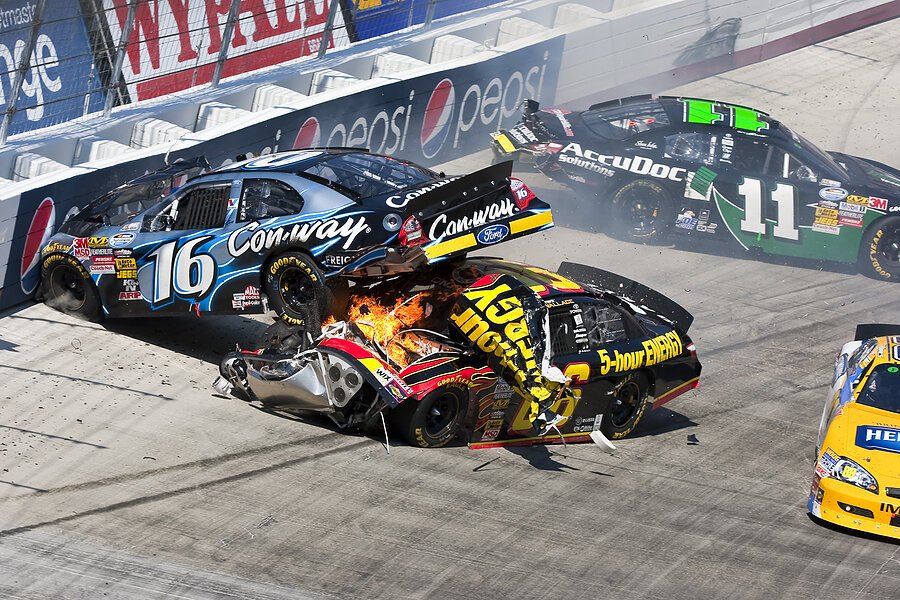Trauma surgeons arguably have much to offer in the pre-hospital arena. Whilst countries such as the UK have been more gung-ho in getting surgeons out in the field performing roadside thoracotomies and the like, there remain a number of sporting events that mandate an advanced trauma response team on-site, which will often include a surgical presence.
Perhaps the highest-profile of these events is motorsports. Surgeons have a significant place in the history of safety improvement in the world of motorsport, none more so than the late great Sid Watkins, a British neurosurgeon who from 1962-1970 was the Professor of Neurosurgery at SUNY, Syracuse and spent much of his free time at the Watkins Glen circuit in Schuyler County, NY.
He served as the Formula One Medical Delegate for 30 years and over the decades pioneered advances in trackside safety by instigating the use of medically equipped cars, medivac helicopters and fully stocked medical centres allowing ICU facilities to be brought to the drivers at their time of need.
Thousands of surgeons such as myself and other trauma physicians around the world now spend a considerable amount of their free time on standby at race circuits ready to provide advanced trauma care to race competitors, with drivers walking away from huge crashes owing to a combination of improved car technology, better materials, improved fire safety and medical care being just seconds away.
Compare that to crashing your car on a highway in the middle of nowhere and one could argue that doing 200mph on a dedicated racetrack at a fully licensed event may well be safer than the drive to and from the venue!
How does my role trackside compare with my role in a regular trauma call at my hospital? On a quiet day, it’s a sweet gig being sat trackside in a comfortable pimped-out SUV with a close-up view of the action and access to competitors that the best tickets in the house can’t buy. But all that can be flipped in an instant, and when things go wrong, they can go really wrong.
When I pull up at an incident with my paramedic colleague, I am the airway guy, primary surveyor, team leader, and decision-maker all wrapped up in one. The availability of local air ambulance services means backup and rapid transportation to the hospital is normally readily available, however, medics operating outside of their familiar hospital environments can feel incredibly exposed and vulnerable during this initial phase of care. Provision of motorsport medical services often comes with a rise in medical indemnity fees.
Whether or not mistakes made in the relatively austere prehospital environment should be judged more leniently than mistakes made in hospitals is up for debate. Thankfully it’s the track owners themselves rather than the doctors they contract that are usually in the firing line for litigation. It’s likely a race competitor’s death would have more to do with poor track design and misfortune than pure medical negligence. And it’s not all wall-to-wall ATLS. Medical emergencies among drivers, their teams, and the crowds that follow are not unheard of.
There are plenty of cases of amateur racers having a medical primary cause for their crash, be it an MI or hypoglycaemic episode. And the last time I had to treat a patient who was hemodynamically unstable from atrial fibrillation it was in fact one of the elderly officials up in the race control tower who had clearly had too much excitement for one day. With that in mind, there is no particular reason why any suitably trained physician shouldn’t be able to offer their service at these events.
Over the years I’ve worked alongside family physicians, obstetricians and even ophthalmologists, all of whom have been ATLS-trained and conversant in the language of trauma resuscitation in the 21 st century.
Some of our colleagues have paid the ultimate price in their roles. Dr. John Hinds, an anaesthesiologist and bike racing enthusiast from Northern Ireland was killed responding to a road race incident on his own motorcycle in 2015. Dr. Hinds was hugely respected, the world over thanks to his entertaining lectures and first-hand experience of the motorsport world both from a competitor’s and physician’s perspective. His death is a constant reminder that real lives are at stake on both sides of the crash barrier and as with most things in medicine, vigilance and a healthy dose of respect for the beast will always go a long way.
Obi Nnajiuba is a British surgical resident with a specialist interest in trauma, acute care, prehospital care, triage, mass casualty events and trauma systems. His postgraduate qualifications include an MSc in Trauma Sciences and membership of the Royal College of Surgeons of England. He is also a registered Motorsport UK physician, providing trackside advanced trauma care to competitors at world famous motor-racing circuits such as Brands Hatch, Goodwood and Silverstone.

